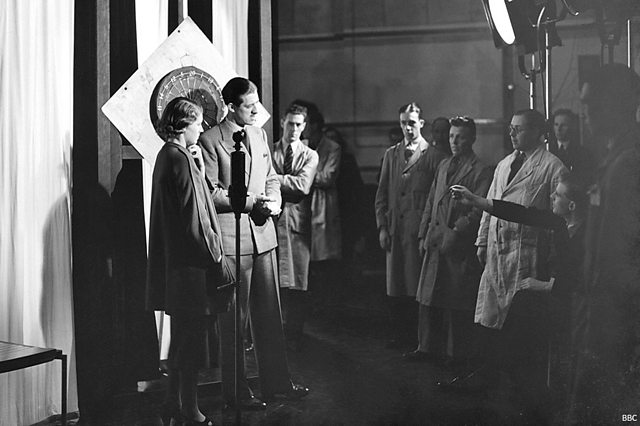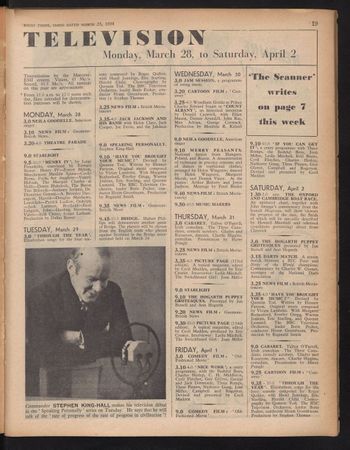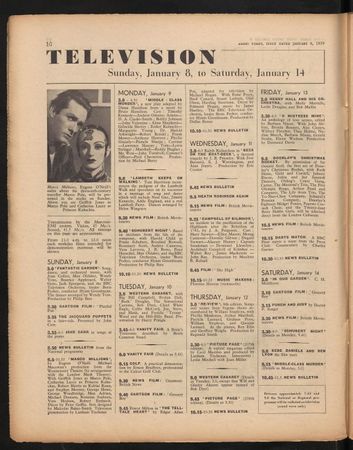Darts and Shove Ha'penny (lost early BBC televised darts matches; 1936-1939)
Jasmine Bligh and Leslie Mitchell rehearsing before appearing in front of a TV camera to commence a darts match.
Status: Lost
Darts and Shove Ha'penny is the title given to a darts match broadcast by the BBC on 29th May 1937, which is considered by most sources as the first televised darts match. Prior to BBC Television Service ceasing transmission following the outbreak of the Second World War, it had televised a number of matches from 1937 to 1939, and a casual match was even shown as part of an Indoor Games test transmission in August 1936.
Background
The distinction of the "first televised darts" depends on whether a test transmission counts. During the BBC's Indoor Games test transmissions at Alexandra Palace in August 1936 prior to the official launch of its Television Service in November later that year, it showed a match between Jasmine Bligh and Leslie Mitchell.[1] Bligh and Mitchell, along with Elizabeth Cowell, were successful in their applications to become the first announcers for the Television Service out of 1,122 applicants, including around 700 women and over 600 men. Factors for selection included male candidates having the ideal handsomeness that avoided "gay goings on", which allegedly eliminated half of the field.[2] As for women, they had to be unmarried and lack red hair.[3] Following the selection process, Bligh and Mitchell rehearsed during the test transmissions. Not much is known about their darts match, but it was shown in one transmission, and a photo of the duo in front of a darts board during rehearsal is publicly accessible.
Darts Matches on BBC Television Service
When the BBC Television Service officially launched on 2nd November, it would take until 29th May 1937 for a darts match to be broadcast. The programme was listed as Darts and Shove Ha'penny, and featured two teams from notable hostelries. Sources such as the Professional Darts Players Association determine this to be the first official televised darts programme.[4] The title Shove Ha'penny implies that not only was regular darts shown, but also the game Shove Ha'penny, where the objective is to shove five coins up the board where points are scored for coins that are between two horizontal lines and bordering vertical lines.[5] Therefore, this most likely was the first televised instance of this pub game too.
According to Darts in England, 1900–39: A social history, the occasional match would be shown from 1937 to 1939.[6] The next match was broadcast on 5th February 1938, featuring a BBC team competing against a team of champions of the News of the World competition, one of the first organised darts tournaments.[7] A return match scheduled on 2nd April that same year; both featured commentary by Charles Garner, who was the secretary of the National Darts Association.[8] On 30th April, another match between BBC and Press Club teams was televised, with a return match occurring on 13th January 1939.[9] On 15th October 1938, a local derby was first shown, featuring teams from Islington and Lambeth, before a rematch was shown on 22nd July that same year. After that, no more matches were shown by the time BBC Television Centre ceased all transmission following the outbreak of the Second World War on 1st September 1939.[10]
Darts may have been an unusual sport to broadcast during this time period. The average viewer that could afford a then-expensive television set often was middle or upper-class in social status, and darts back then was a rather novel sport. Darts in England, 1900–39: A social history theorises that not only did the BBC ultimately decide some darts games would be worthy inclusions for its programme schedule, but also how simple it was from a technological perspective to televise the games. The indoor nature of the games likely played a factor, considering the challenges of outside broadcasts for other sports like football and tennis.[11] All of the matches were situated at Alexandra Palace, which to this day remains as the venue for the Professional Darts Corporation's World Darts Championship.[12]
Availability
Like most early BBC programs, the darts matches were televised live and were not directly recorded, as there were virtually no viable means of achieving this prior to the end of the Second World War.[13] Thus, all footage of these darts matches is now permanently missing. Nevertheless, some media, including from relevant Radio Times issues listing key darts matches and the surviving photo of Bligh and Mitchell, helped to document these missing events.
Gallery
Images
See Also
- Bullseye (lost pilots of dart-based game show; 1981)
- Bullseye (partially found coverage of professional darts tournaments; 1979-1981)
- Bullseye (partially lost episodes of dart-based game show; 1981-1986)
References
- ↑ BBC Genome Blog noting the Jasmine Bligh-Leslie Mitchell match during a test transmission and providing a surviving photo. Retrieved 30 Oct '21
- ↑ Teletronic detailing the test transmissions, and how male television presenters were selected. Retrieved 30 Oct '21
- ↑ Showreel detailing criteria for female television presenters. Retrieved 30 Oct '21
- ↑ Professional Darts Players Association proclaiming the 29th May, 1937 match as the first televised darts programme. Retrieved 30 Oct '21
- ↑ An explanation of the game Shove Ha'penny. Retrieved 30 Oct '21
- ↑ Darts in England, 1900–39: A social history detailing the matches shown on BBC Television Service and theorising why they were included. Retrieved 30 Oct '21
- ↑ Darts 501 detailing the News of the World Championships. Retrieved 30 Oct '21
- ↑ Issue 756 of Radio Times listing the 2nd April, 1938 match and noting Charles Garner would be the commentator. Retrieved 30 Oct '21
- ↑ Issue 797 of Radio Times listing the 13th January, 1939 match. Retrieved 30 Oct '21
- ↑ BBC Handbook for 1940 extract published on Transdiffusion, discussing BBC Television Centre ceasing all transmissions following the outbreak of the Second World War. Retrieved 30 Oct '21
- ↑ BBC discussing the challenges of outside broadcasting back in the 1930s, including for the 1937 Wimbledon Championships. Retrieved 30 Oct '21
- ↑ Professional Darts Corporation discussing hosting the World Darts Championship at Alexandra Palace, until at least the end of the 2024/25 event. Retrieved 30 Oct '21
- ↑ Web Archive article discussing how most pre-Second World War television is missing due to no means of directly recording television. Retrieved 30 Oct '21


